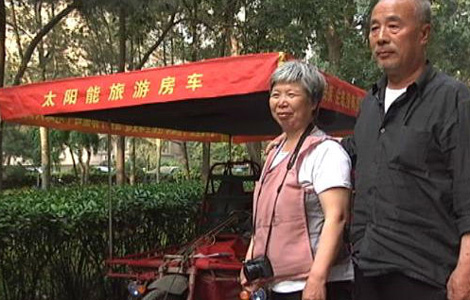EU solar duties on China: a lose-lose blunder
Updated: 2013-06-05 17:03
(Xinhua)
|
|||||||||||
BEIJING, June 5 -- The European Commission's decision to impose provisional anti-dumping duties on Chinese photovoltaic products will create a lose-lose situation.
This protectionist hoo-ha would either face an embarrassing rejection by European Union member states months later, or could drag the European economy as a whole into an uncalled-for turmoil, even a trade war.
EU Trade Commissioner Karel De Gucht is a staunch supporter of the punitive tariffs.
He went his own way despite opposition and warnings from 18 EU member states, hundreds of European solar companies, 15 European photovoltaic associations, various trade associations as well as industry experts.
De Gucht needs to readjust his probe to the Chinese photovoltaic products in a holistic way. The tariff plan, which was proposed up to 67.9 percent, is not a reviving engine for the European economic downturn.
Duties of 20 percent would cost the European economy up to 175,500 jobs and 18.4 billion euros of added value over the next three years, according to independent economic research institute Prognos.
It will also hurt the China-EU trade cooperation as the photovoltaic products have accounted for 7 percent of all Chinese exports to the bloc in 2011.
As Chinese solar panels account for about 80 percent of the European market, the punitive duties, along with skyrocketing fossil fuel subsidies, will be detrimental to the EU's commitment to climate change and the European society as well.
Although the provisional duties were set lower than expected for the first two months, it is hard to find a solution in such a short time span given the current market development leaves no room for price increases.
If an agreement could not be reached between the EU and China on August 6, the provisional duties, which will rise to 47.6 percent, could cause severe damage on the European solar value chain.
In December, the EC will need backing from member states to extend the duties. The EU executive arm is likely to face mounting pressure and an embarrassing rejection.
It is normal that frictions emerged in China-EU trade ties given the large trade volume between the two sides, but the frictions should be solved through consultations and dialogue.
Since the tariff proposal emerged in May, China has been calm and restraint, willing to find a reasonable solution acceptable for both sides.
Chinese Premier Li Keqiang on Monday night called on the EU to resolve the dispute through dialogue and consultation, noting that the case, if not properly handled, would hurt both Chinese and EU interests.
The European Commission should avoid wielding the baton of trade protectionism, and take a long-term strategic approach to safeguard the overall development of China-EU trade relations.
China is firmly opposed to trade protectionism and abuse of trade remedy measures. There would be no winners in a trade war.
Related Stories
European firms oppose EU tariffs on Chinese solar panels 2013-06-05 11:12
Chinese solar companies oppose EU tariff 2013-06-05 11:07
Solar duties risk China-EU trade ties 2013-06-05 10:19
No ray of sunshine in solar panel dispute 2013-06-05 08:02
EU imposes heavy duties on Chinese solar products 2013-06-05 02:49
Today's Top News
EU imposes duties on solar products
Sino-Mexican relation 'relaunched'
Solar duties risk China-EU trade ties
Protectionism hurts EU exports to China
China joins fight against hacking
Police advise women to 'cover up'
Beijing to have more clean-energy taxis
China's water quality 'not optimistic'
Hot Topics
Lunar probe , China growth forecasts, Emission rules get tougher, China seen through 'colored lens', International board,
Editor's Picks

|

|

|

|

|

|





